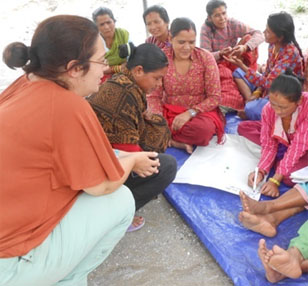In the lessons learned sessions organized in VIN for Jitpurphedi community with 24 women groups, around 136 participants gave their advice about what to do and what not to do during earthquake. Their wisdom and experiences they had can be very useful for future generation. It is true; we should follow some disaster management plan. Here is women’s experience and opinion; it is summarized in following topics:
Before an earthquake
Family members should sit together and talk about the possibility of earthquake and what to do during an earthquake. The small emergency kit including first aid suppliers, some food and water and copies of important documents should be prepared and placed in convenient place so that it can be taken when fleeing the house.
During an earthquake
During big earthquake, coming out of the houses into an open space is best option as hiding under a bed or table is useful only during small earthquake. Instead of rushing and running, staying calm, keeping the children close and helping each other is more important.
After an earthquake
Once the incident has occurred, giving medical attention to injured should be given the first priority. After that help should be provided to earthquake victim to rebuild the community. Proper care for sanitation and cleanliness helps in preventing the occurrence of any disease. Sharing feeling and helping each other is the best way to overcome from this disaster.


 Member of
Member of